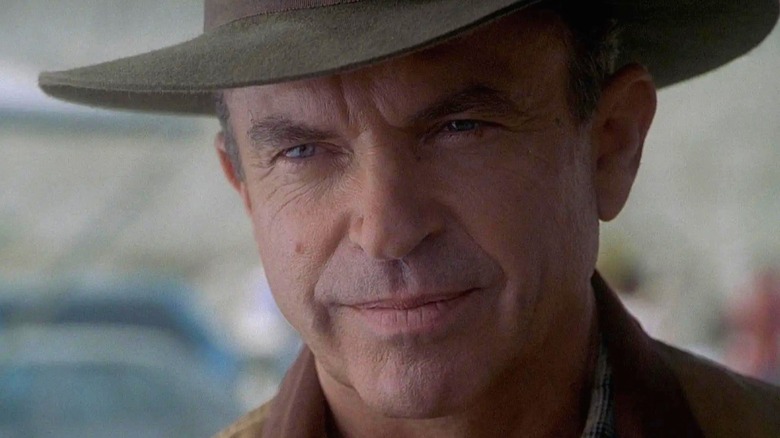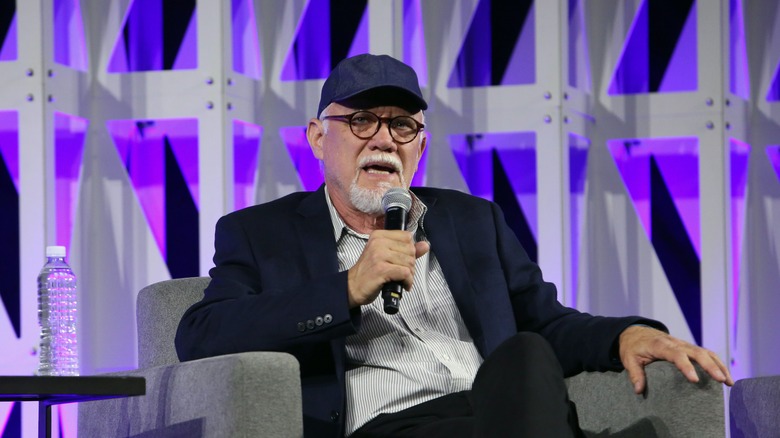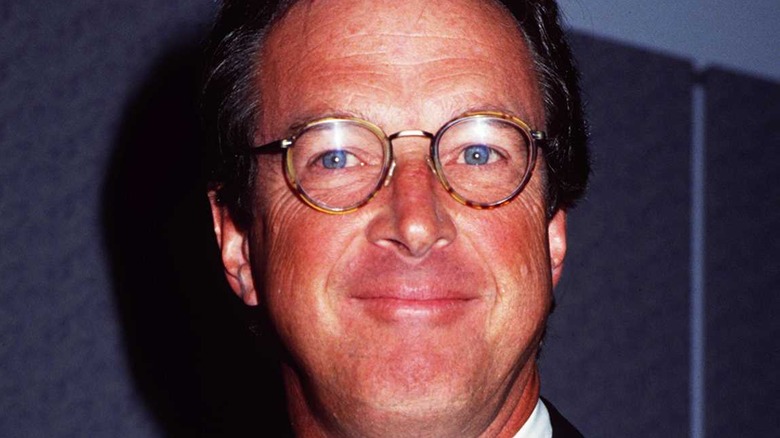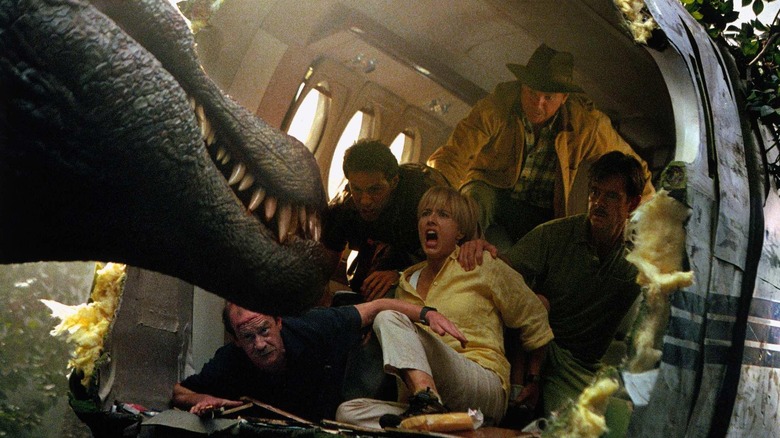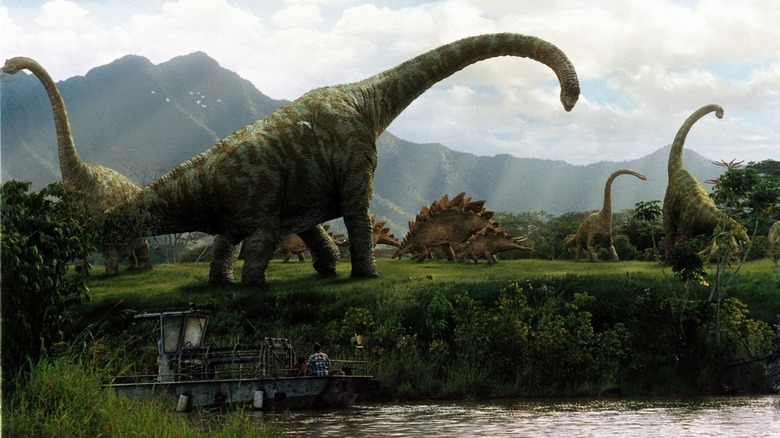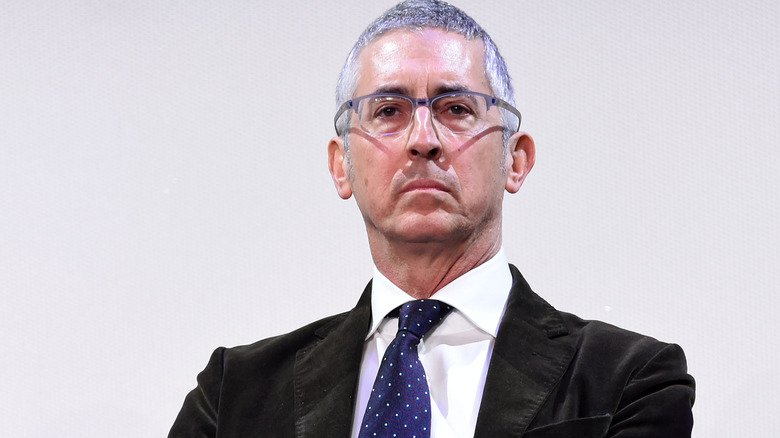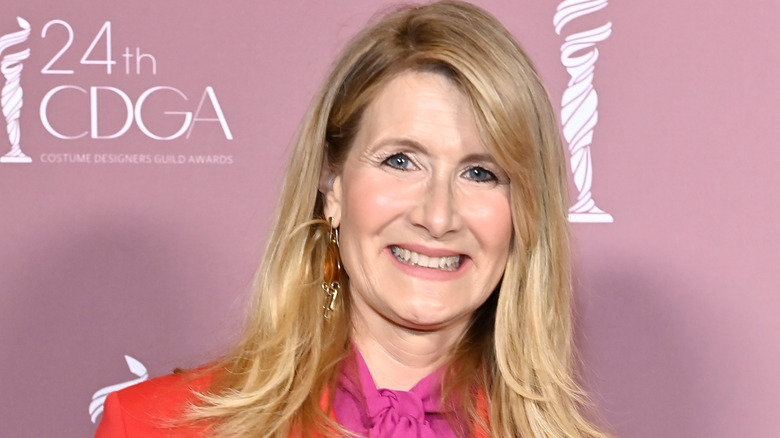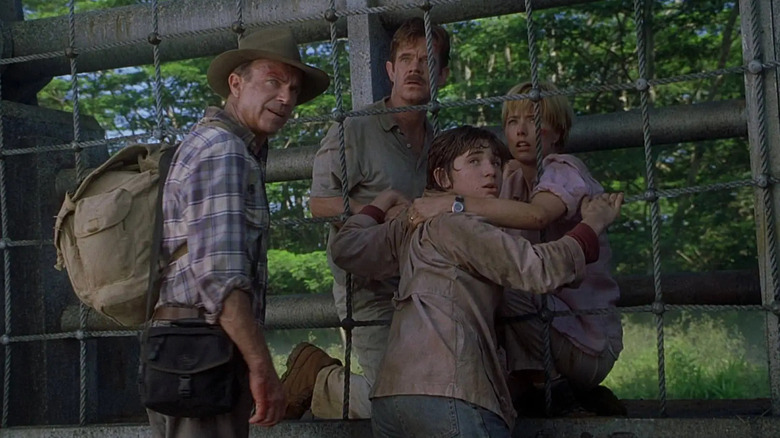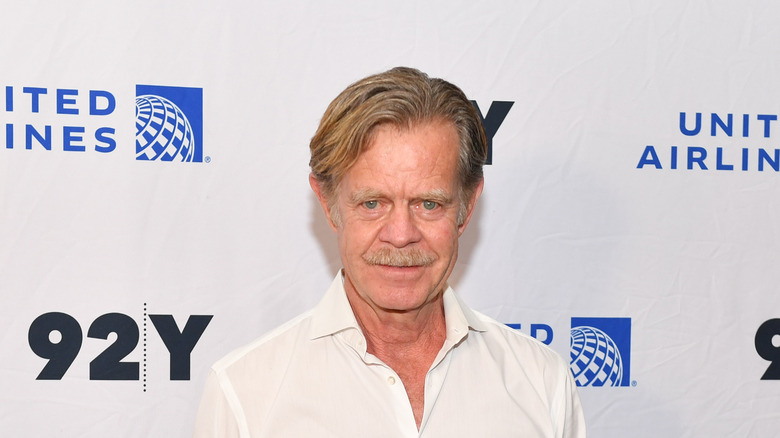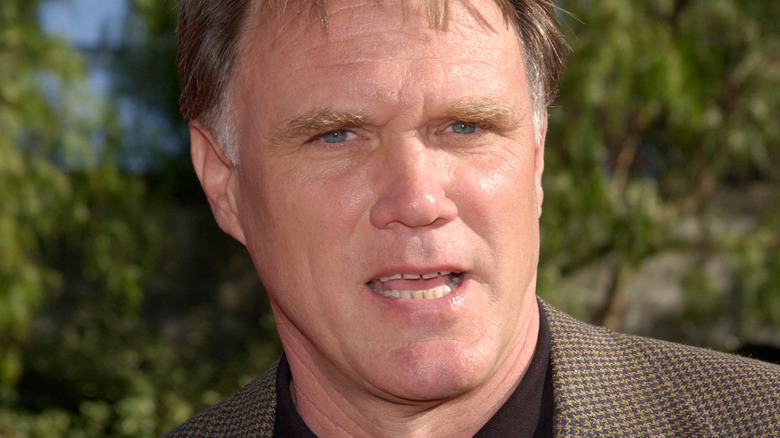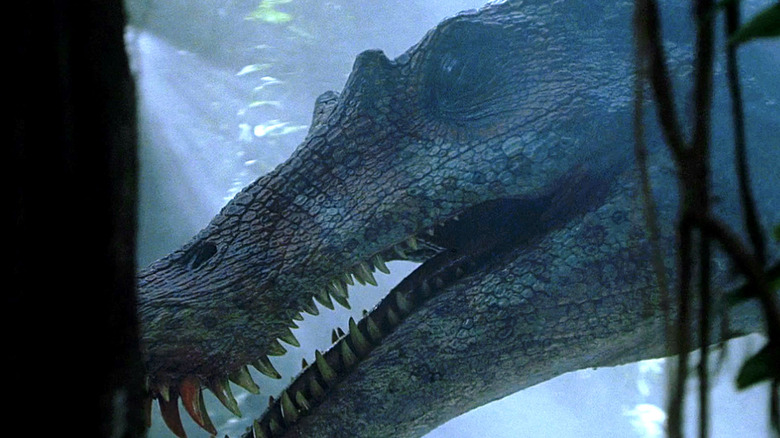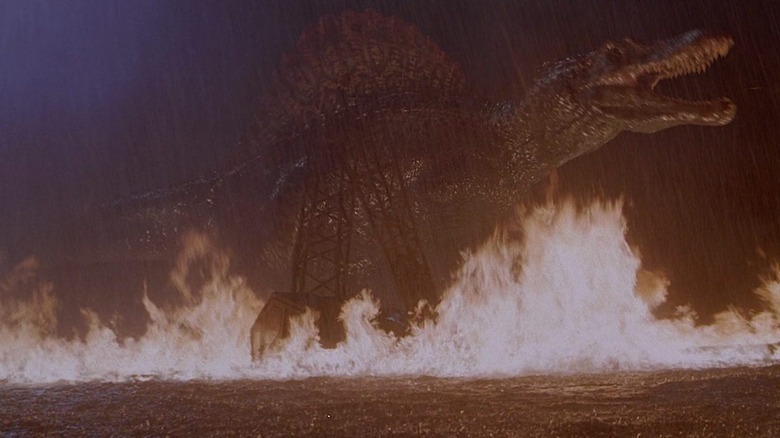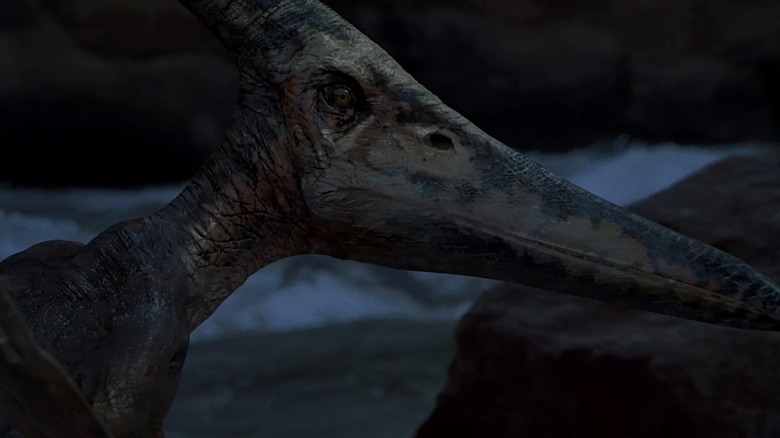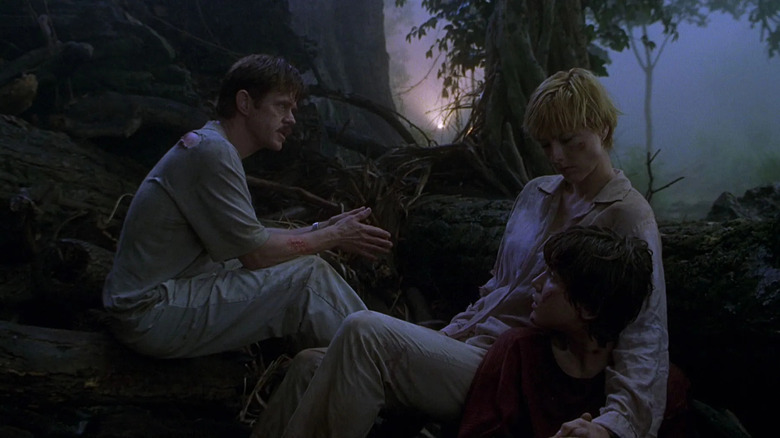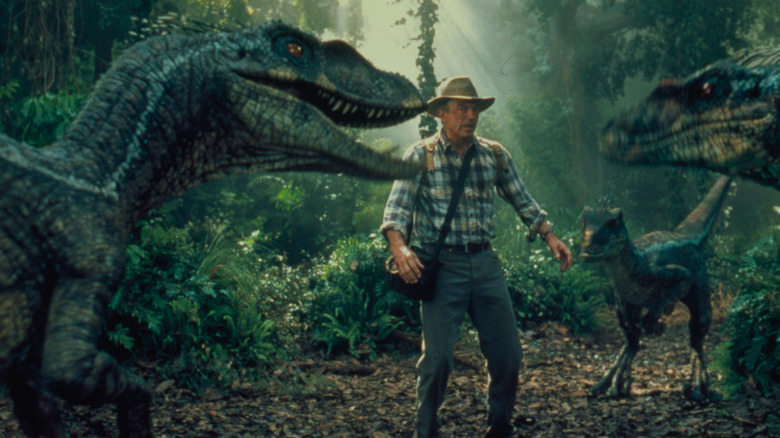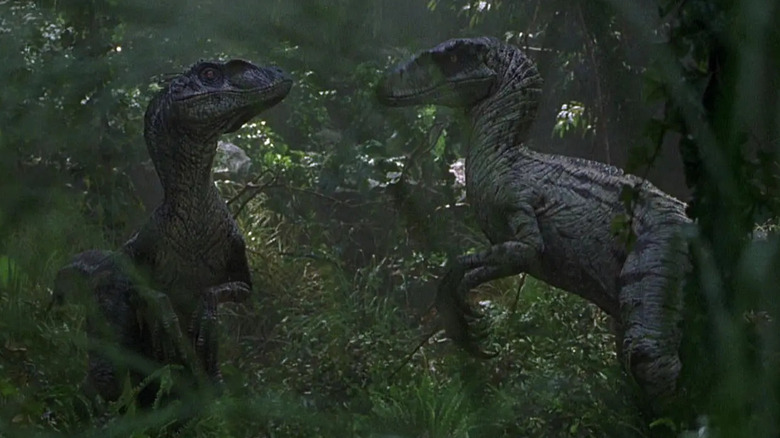The Untold Truth Of Jurassic Park III
The saga of "Jurassic Park" is filled with instantly iconic lines and imagery, but, like any long-running film series, it has its share of installments that have garnered a divisive reputation. So it is with "Jurassic Park III," a 2001 entry in the saga that brought the "Jurassic Park" movies into the 21st-century.
Featuring the return of "Jurassic Park" protagonist Dr. Alan Grant (Sam Neill), "Jurassic Park III" brought viewers back to Isla Sorna, which was introduced in "The Lost World: Jurassic Park." It delivered brand new dinosaurs to the franchise's mythology, including the Spinosaurus, although it scored mixed reviews upon its initial theatrical release. While "Jurassic Park III" was not necessarily a beloved motion picture, it was still a heavily-marketed entry in the "Jurassic Park" saga, which means that it was still a widely seen movie. Given its ubiquity, then, it can be surprising to learn that, much like the concealed island of Isla Sorna, there are facets of the production that are not common knowledge among the general public.
The untold truth of "Jurassic Park III" largely concerns the chaotic production of this title, which somehow managed to get off the ground without a completed script, but also concerns details how Don Davis felt taking over for John Williams as the composer for the "Jurassic Park" movies and even how "Jurassic Park III" has fared in the public eye since its release. Hold on to your butt, folks, it's time to sink your claws into the untold truth of "Jurassic Park III."
How Joe Johnston got the Jurassic Park III directors chair
"Jurassic Park III" marked an important stepping stone in the history of the "Jurassic Park" franchise as it marked the first time that somebody besides Steven Spielberg was helming an installment in this franchise. This might sound strange to modern-day viewers of these movies since "Jurassic World" directors like Colin Trevorrow and J.A. Bayona would eventually make this a norm for the series. However, at the dawn of the 21st century, it was an extremely noteworthy development for "Jurassic Park III" to have Joe Johnston stepping behind the camera in a saga deeply associated with Spielberg.
Talking to IGN, Johnston said that his commitment to directing something in the "Jurassic Park" universe dated back to a screening of the original film. After watching this production, Johnston made an offer to Spielberg that he would love to direct a potential "Jurassic Park" sequel if Spielberg wasn't interested. While the acclaimed auteur would go on to helm "The Lost World: Jurassic Park," Johnston recalled getting a phone call from Spielberg roughly six years after his initial offer asking him if he'd be interested in tackling "Jurassic Park III." From there, Johnston signed onto the project and made history with his presence in the director's chair here. Thanks to Johnston throwing his hat into the ring, the "Jurassic Park" series was officially no longer beholden to having Steven Spielberg serve as the director.
Michael Crichton was originally announced as the screenwriter
Roughly a year after "The Lost World: Jurassic Park" hit movie theaters and shattered box office records, Variety revealed that Universal Pictures had made the expected announcement that a "Jurassic Park III" was now on the way. This announcement also mentioned that, unlike its predecessors, this sequel would not be based on a book penned by "Jurassic Park" author Michael Crichton. However, Crichton was still prepared to be involved in the project, as he was set to be the film's screenwriter.
Though most famous for being a prolific author, Crichton also had extensive experience in the world of screenplays. Not only was he a credited screenwriter on the first "Jurassic Park," but he also penned other blockbusters like "Twister" and also wrote the scripts for his assorted directorial efforts, such as "The Great Train Robbery" and "Coma." Given this lengthy resume, not to mention his status as the creator of the entire franchise, it made perfect sense to invite him aboard to hatch a script for a third "Jurassic Park."
Unfortunately, Crichton's presence on "Jurassic Park III" would be short-lived. He would eventually get replaced by another screenwriter in 1999 and would have no creative involvement in the final film. However, Crichton would still be given a "Characters created by" credit in the credits of "Jurassic Park III," a reflection of how much this franchise owes to this author.
The first official screenwriter for Jurassic Park III
While Michael Crichton would not end up writing the script for "Jurassic Park III," it wouldn't be long before the production secured its first firm screenwriter in the form of Craig Rosenberg, per Variety. This screenwriter didn't have a lot of experience with penning blockbusters, let alone entries in the "Jurassic Park" franchise, but his vision for "Jurassic Park III" apparently struck a chord with Joe Johnston and Steven Spielberg. With that, "Jurassic Park III" was off to the races, with plans at this point being for the blockbuster to start shooting in the early months of 2000.
Rosenberg would not get a screenwriting credit on the final cut of "Jurassic Park III," a testament to how wildly this project's story evolved during its production. Reflecting back on Rosenberg's draft, Johnston told DVDFile that this initial screenplay focused on a gaggle of teenagers who become trapped on Isla Sorna. Rosenberg's concept sounds like it would've certainly been different from the first two "Jurassic Park" movies, though it apparently went too far in this direction by reminding Johnston primarily of "a bad episode of 'Friends.'" He also noted that Rosenberg left the project by September 1999, a little under a year before "Jurassic Park III" began filming. Much like Crichton, Rosenberg was another early "Jurassic Park III" screenwriter who would not stick with the project for long.
The Jurassic Park III script was rejected before filming began
You might imagine that big-budget movies are endeavors that are tightened down to the letter before they begin filming. With so much money on the line, it would seem preposterous to leave anything to chance. However, countless expensive blockbusters have demonstrated that this is far from the norm. The Hollywood Reporter notes that productions like "Men In Black 3" begin shooting without a finished screenplay, as everyone involved was more interested in meeting a projected release date than anything else. "Jurassic Park III" was another notable example of this phenomenon.
Despite costing well over $90 million to make, "Jurassic Park III" was just a few weeks away from the start of principal photography when its screenplay was scrapped. Former Universal chairman Stacey Snider explained to The Hollywood Reporter that "Jurassic Park III" managing to continue production after such a setback was largely due to the efforts of Kathleen Kennedy. She managed to quickly come up with a new plan to make the movie fit the quality standards of Joe Johnston and Steven Spielberg and even figured out how to ensure that the $18 million spent on the film up to that point wouldn't be just thrown away. Even with an experienced producer to help steady the ship, this sudden challenge for "Jurassic Park III" was far from ideal and speaks to how often blockbusters are made on the fly.
Alexander Payne penned a Jurassic Park III draft
The career of Alexander Payne has been rife with adult dramas that have often secured major award season recognition. What it has not been full of are big-budget summer blockbusters. However, Payne added one such title to his filmography in 2000 when he was hired, along with "Election" screenwriter Jim Taylor, to do a new pass on the script. This was done roughly a month before "Jurassic Park III" was set to begin filming, with an extremely condensed schedule to finish any script, let alone one for a movie that was meant to be a massive summer blockbuster.
Talking to BBC in 2005, Payne looked back on his "Jurassic Park III" with amusement, primarily because he and Taylor only got the gig due after completing a rewrite of "Meet the Parents" for Universal Pictures. He also observed that he and Taylor were hired to provide some human drama to a script that was already heavy on spectacle. The duo proceeded to turn in a new draft right on time, but according to Payne, the majority of their work was cut out of the film. This, along with the fact that Payne and Taylor both received screenwriting credits on the final film, provides an appropriately bizarre capper to the saga of the man behind "Sideways" getting hired to write a "Jurassic Park" movie.
Laura Dern wasn't supposed to be in Jurassic Park III
Laura Dern's Ellie Satler was one of the stars of the original "Jurassic Park" and later became a focal point of the marketing for "Jurassic World Dominion." However, she hasn't been as prominent throughout the entire franchise as her fellow "Jurassic Park" leads. Sam Neill and Jeff Goldblum got to headline other entries in the franchise while Dern was largely left on the sidelines. Though she did manage to come back for a brief appearance for "Jurassic Park III," even this ended up reflecting her character's erratic presence in the "Jurassic Park" saga — especially since Dern wasn't even supposed to be in the movie.
Speaking to the Omaha World-Herald, screenwriter Alexander Payne noted that the draft he and Jim Taylor penned was responsible for bringing Dern's Ellie Slater back to the franchise. Recognizing her absence in "The Lost World: Jurassic Park" and having worked with Dern on "Citizen Ruth," the two screenwriters were determined to bring Satler back into the "Jurassic Park" fold. While some Dern is better than none, her largely minimal role in the film was an unfortunate reflection of the smaller part this Oscar-winning actor had to play in the "Jurassic Park" saga.
Jurassic Park III's lack of a finished script
With a screenplay rejected just weeks before filming began, one would expect the production of "Jurassic Park III" to get paused so that a proper screenplay could be written. However, blockbusters rarely play by sensible rules. "Jurassic Park III" began principal photography even without a finished script to base everything around. The whole production went forward, making things up as it went along, with Joe Johnston revealing to About.com that there was never actually a completed script while the cameras were rolling.
Johnston elaborated on this matter by explaining that the cast and crew would have script pages for the day they were shooting and occasionally for the following day, but that was it. There was never a larger completed screenplay for everybody to work with. This resulted in the film's ending getting created during reshoots, as nobody could figure out what the conclusion should be while they were originally filming. While they were able to wring a completed and even lucrative movie out of such haphazard filmmaking, it's still strange to consider a massive blockbuster getting made in a quasi-improvisational manner.
William H. Macy's complicated feelings about Jurassic Park III
William H. Macy was a fixture of indie films throughout the 1990s, appearing in such beloved titles as "Fargo" and "Boogie Nights." Even with his lengthy experience in a wide variety of features, though, nothing he'd done would prepare him for his time on the set of "Jurassic Park III." Playing one of the film's most prominent characters, Mr. Kirby, Macy ended up having extremely complicated feelings about his time on the set of "Jurassic Park III," which were perfectly crystallized in a series of comments he made to The A.V. Club.
Part of Macy's frustration with "Jurassic Park III" came about from how little progress was made on the feature on a daily basis, with the actor noting that sometimes the production would only accomplish "an eighth of a page" in a full 12-hour day of shooting. Working within such a slow-paced environment, Macy noted that it was difficult to maintain energy and enthusiasm for the project.
At the same time, Macy did note that he was amazed at getting to work with Stan Winston's animatronic dinosaurs, which were apparently on-set for almost the entirety of the production. Macy was amazed at how much these puppets could do and how much they gave actors to work off. Macy had a rollercoaster of an experience shooting "Jurassic Park III" in terms of being both astonished and frustrated with how this blockbuster was made.
Joe Johnston's experiences shooting Jurassic Park III
Joe Johnston is a veteran of big-budget blockbusters. His experience in this field dates back to his days of providing design work for the original "Star Wars" trilogy, including helping to mold the appearance of Boba Fett. From there, he began to direct movies like "The Rocketeer" and "Honey, I Shrunk the Kids," both of which gave him the knowledge of how to oversee and corral a movie being brought to life with so many visual effects. Even with all that experience, though, nothing could prepare Johnston for the particulars of directing "Jurassic Park III," a movie that took its toll on the director and proved to be anything but a walk in the park.
Talking to the New York Post, Johnston described the process of making "Jurassic Park III" as "very stressful" and a "challenge" thanks to overwhelming issues like having the film's screenplay thrown out weeks before principal photography began. For someone who usually gravitates toward intense preparation on his projects, the improvisational nature of "Jurassic Park III' was not ideal for Johnston, who did admit that having to constantly make up things did give everyone involved "more freedom" to take risks during principal photography. At the time, Johnston also said he would need lots of time before he even considered directing another "Jurassic Park" movie, a testament to just how much of a challenge this production was.
What made the Spinosaurus a good enemy for Jurassic Park III
In "Jurassic Park III," an especially controversial change occurs. For the two preceding "Jurassic Park" installments, the T-Rex had been the most prominent dinosaur. These creatures often served as initial antagonists before transforming into heroes you loved to see fight raptors or chomp down on mean humans. However, in "Jurassic Park III," a T-Rex is dispatched early on to emphasize the might of the new lead dinosaur of the feature, the Spinosaurus. This beastie would hunt Alan Grant and company all across Isla Sorna and make a case for a new iconic foe in the saga.
Talking to ABC News, paleontologist Jack Horner, who has served as a consultant all throughout the "Jurassic Park" franchise, revealed that he was the primary motivating force behind getting the Spinosaurus into "Jurassic Park III." A personal favorite dinosaur of Horner, this dinosaur expert urged the crew behind "Jurassic Park III" to make room for the Spinosaurus mostly because he was getting exhausted from working so much with the T-Rex. Talking to Cinema Review, director Joe Johnston also noted that the Spinosaurus was appealing as a new adversary because of its distinctive shape and appearance. There was no chance audiences were going to mistake a beastie with that massive spine and that long jaw for any other creature in the franchise.
The original death scene for the Spinosaurus
In the final cut of "Jurassic Park III," the last time audiences get to see the big new dinosaur baddie of the feature, the Spinosaurus, is during a riverside showdown between this prehistoric beast and the primary human characters. The confrontation ends spectacularly when a massive fireball scares off the beast back into the jungle, but it's decidedly alive at the end of the film. Given that the Spinosaurus didn't get the kind of concrete ending one would expect for such an explicitly antagonistic dinosaur, it shouldn't be a surprise that there was originally a more definitive conclusion planned for this ravenous beast.
Per ScreenRant and YouTuber Klayton Fioriti, "Jurassic Park III" would have originally paid off Alan Grant's Velociraptor Resonation Chamber by having the character use it to assemble a gaggle of Velociraptors. At this point, a new showdown would begin as a pack of raptors attempted to take down the Spinosaurus. While the earlier T-Rex versus Spinosaurus duel at the start of "Jurassic Park III" concluded with the newer dino winning the skirmish, this time around, the raptors would eventually conquer their larger prey. With that, the Spinosaurus would have had a definitive ending in the film. However, this planned death scene was cut so early in production that it was never filmed. This meant that the Spinosaurus, despite being the most prominent antagonistic dinosaur in the film, would get no concrete resolution in "Jurassic Park III."
The cut final Pteranodon action sequence
"Jurassic Park III" is infamous for having a whimper of an ending. After the main characters evade an attack by a bunch of raptors, the US military shows up on the beaches of Isla Sorna. Called into action thanks to Ellie Satler, these armed soldiers are ready to save everybody and bring them back to the mainland. From there, everybody gets home safely– even Billy, who is revealed to have survived an earlier attack by the Pteranodons. It's an overly tidy and happy conclusion, but it wasn't always how "Jurassic Park III" was set to end. Initially, the film was going to send audiences home with a much bigger bang.
Talking to Jurassic Outpost, the film's cinematographer, Shelly Johnson, revealed that originally a Pteranodon would've attacked the helicopter that the film's main characters were leaving on. It would've provided one final thrill and built upon the earlier sequence of the Pteranodons in their gigantic cage. However, Johnson said that the scene, which he was not even sure made it into the screenplay, was deleted because of its costs. With the price tag for this set piece being too high, "Jurassic Park III" instead of closed out on a much quieter, less extravagant note. Interestingly, though, this scene hasn't entirely vanished from "Jurassic Park" lore, as Johnson mentioned that a gaggle of Pteranodons attacking a helicopter in "Jurassic World" bore a striking resemblance to this deleted "Jurassic Park III" set piece.
Don Davis's experiences taking over as the Jurassic Park composer
"Jurassic Park III" wasn't just the first film in the franchise directed by someone other than Steven Spielberg. It was also the first "Jurassic Park" movie that wouldn't be composed by John Williams. Instead, Don Davis, the composer of the original "Matrix," would be tackling those duties. It's a big responsibility for a composer to walk into any long-running franchise with a pre-established musical sensibility, let alone one that's been defined by John Williams. Luckily, Davis had his own thoughts on what he could bring to the franchise to ensure he wasn't just working in the shadow of Williams.
Talking to Industry Central, Davis noted that he found it to be an "honor" to work with the pre-established themes Williams had brought to earlier entries in the "Jurassic Park" saga. However, Davis did recall how he had to tweak some of them slightly just to fit into the specific pacing of "Jurassic Park III." Davis also delivered unique themes for "Jurassic Park III," namely for the married Kirby couple, to ensure that the fresh faces in the franchise would have idiosyncratic audio elements to work with rather than just waltzing around with pre-established musical motifs. Finding the balance between the old and the new is hard work on any artistic project, but it was a challenge that Davis rose to and then some in getting his "Jurassic Park III" score off the ground.
The box office run of Jurassic Park III
The first two "Jurassic Park" movies shattered box office records and set new standards for how big summer blockbusters could be. "Jurassic Park III" was never going to be able to replicate that kind of success, partially because of its placement in the franchise. "The Lost World: Jurassic Park" was riding a tidal wave of good buzz from the original "Jurassic Park," whereas "Jurassic Park III" was arriving on the more mixed reception of "The Lost World." It was inevitable that "Jurassic Park III" would end up beneath its predecessors, an outcome that came to pass when it grossed $365.9 million worldwide, including $181.6 million in North America.
The domestic run of "Jurassic Park III" wasn't too bad, especially since it managed to score the fourth-biggest July opening weekend of all time at the time of its release, per ABC News. It was also down only 21% from the North American haul of "The Lost World: Jurassic Park." Unfortunately, the film's $184 million international sum was less than half of the $389 million international haul of "The Lost World," a much more worrisome part of its box office run. In the end, "Jurassic Park III" proved to be plenty profitable on a $93 million budget and was far from a flop. However, this title did indicate that the bloom was off the rose a bit in terms of how much allure the "Jurassic Park" name had with moviegoers.
The critical re-evaluation of Jurassic Park III
When "Jurassic Park III" first hit theaters in July 2001, critics were not kind to the movie. The abbreviated runtime, annoying characters, and the lack of a prominent role for the T-Rex all were common critiques of the feature's general reception, which was far from the glowing response "Jurassic Park" had garnered nearly a decade earlier. But, like life itself, positive reviews of "Jurassic Park III" managed to ... find a way.
In the years since its release, reevaluations of "Jurassic Park III" have provided a defense of the movie. Emma Stefansky of Thrillist, for one, wrote an essay entitled "I Don't Understand Why Everyone Hates 'Jurassic Park III,'" with her praise of the film centering on factors like the terrifying nature of the Pteranodons and the performance of William H. Macy. Sean Naughton of Collider, meanwhile, opined in 2022 that "Jurassic Park III" worked just fine as exciting entertainment if it was taken as a B-movie. Calum Russell of Far Out Magazine also observed that "Jurassic Park III" benefited mightily by setting its story against striking imagery of crumbled InGen laboratories and buildings, a visual manifestation of man's follies.
Even leading man Sam Neill has come to the defense of "Jurassic Park III" in recent years. While conceding that the climax was underwhelming, Neill noted that he felt the film still delivered solid adventure thrills. As the widespread reevaluation of "Jurassic Park III" indicates, Neill is far from alone in that opinion.
